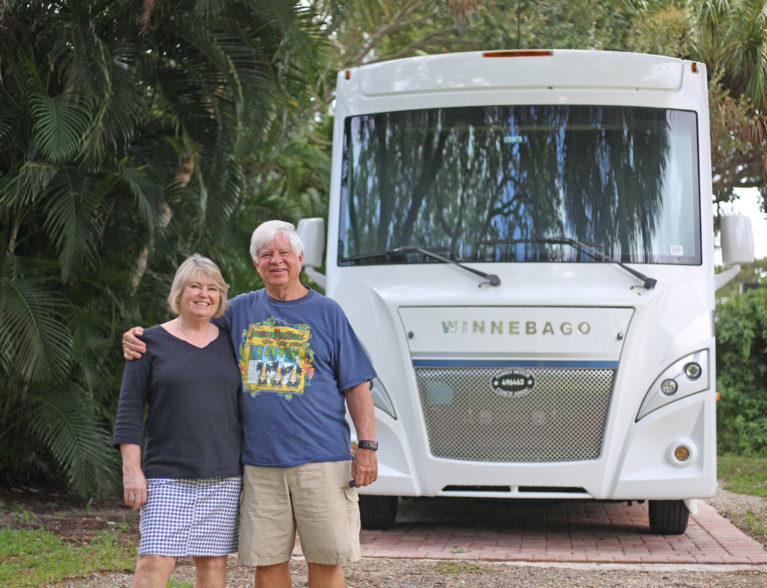
Jim O’Connor spent the last eight years of his career steering Vero Beach through the twists and turns of a challenging and sometimes-exhausting journey to the $185 million sale of the city’s electric utility to Florida Power & Light, finally reaching that destination in February.
It proved to be good preparation for the next phase of his life.
O’Connor, who retired as Vero Beach’s city manager in March, now spends much of his free time traveling with his wife, Sherry, in their motorhome, embarking on outings that have provided more than a few unexpected adventures and tense moments.
“The scariest part of having a motorhome,” O’Connor said, “is driving it.”
In fact, O’Connor will tell you: Piloting his year-old, 27-foot-long Winnebago can be far more nerve-wracking than anything he encountered while closing the sale of Vero Electric.
On a recent trip to Tennessee, for example, O’Connor, who prefers to stay off the interstates when possible, found himself driving along a two-lane mountain highway in rural Georgia, where 18-wheel tractor-trailers whooshed by in the opposite direction.
“You’re driving an 11-foot-wide, 13-foot-high motorhome in a 12-foot-wide travel lane, so you’re already at full concentration,” O’Connor said. “Then you’ve got semis whizzing past you in the other direction, and you can feel the thrust of the air pushing against you.
“It can get a little unstable,” he added, “so you’re hanging on to the steering wheel.”
Not that the O’Connors – who have been married for 50 years – have any regrets: Years before they retired, they had decided to explore the recreational-vehicle lifestyle.
Growing up in Rocky Top, Tennessee, not far from Knoxville, O’Connor’s wife experienced “RVing,” as she called it, in a hearse her father converted into a motorhome.
O’Connor, also from the Knoxville area, did some camping as a youth and, later in life, would go on camping trips with his wife and then-young children in a pop-up camper.
But it wasn’t until a year-and-a-half ago that O’Connor actually drove a motorhome, when he and his wife rented an RV and embarked on a test run to a country music festival in Live Oak, Florida.
“We had been looking at them, but we decided to rent one first, which is what we’d strongly recommend,” O’Connor said. “I hadn’t driven a truck since using a U-Haul in college, and I thought driving the motorhome would be like driving a van. I was wrong.
“That one trip gave us the motorhome experience we needed before we bought one,” he added. “Now, RVing is our thing.”
When in Vero Beach, the O’Connors park their Winnebago on pavers alongside their barrier island home. When on the road, they usually stay in campgrounds at county, state or national parks, or in privately operated RV parks.
Their trip to Tennessee was their first outside Florida.
“It was farthest we’ve gone and the longest amount of time we’ve spent in the motorhome so far,” O’Connor said. “We were gone for 21 days, which I thought would be a stretch, but it wasn’t bad.”
Other trips have kept them on the road for a week or two, during which they’d often stop for the night, spend a full day visiting an area and then leave the next morning.
The longer the trip, though, the more planning is required, O’Connor said.
“That’s where it gets tough for us, because we’re not planners. We like to just pick up and go. Fortunately, a lot of the parks will set aside a few sites they won’t rent in advance, so you can almost always find a place to camp for one night.
“You can also camp for a night at most Cracker Barrel restaurants, or a Flying J gas station, or sometimes even a Walmart parking lot.”
Most of the O’Connors’ outings, however, have been weekend getaways to Florida destinations, so, unlike many RVers, they don’t tow a car. Instead, they rely on Uber and Lyft to go into nearby towns. Or, when practical, they ride their bicycles.
Sometimes, other campers will offer rides into town or allow the O’Connors to borrow their cars.
“RVers are very friendly people,” O’Connor said. “Every time we’ve camped, we’ve met new people, and it was like having neighbors. It’s mostly retirees – Baby Boomers are driving the industry – but a lot of times they’ll bring along their kids and grandkids.
“It’s a way of life for some people, and you meet folks from all walks of life,” he added. “Some of them actually live full time in their motorhomes. There are also people who come to Florida for the winter and will spend five or six months in them.”
The O’Connors’ motorhome has a well-equipped kitchen, dinette, bathroom, shower, television and a queen-sized bed, as well as an exterior bar area. It gets only 8 miles per gallon, but it has an 80-gallon tank.
“I remember asking the salesman about mileage,” O’Connor said, “and he said, ‘If you have to ask that, you probably shouldn’t be looking for a motorhome.’”
The O’Connors, though, knew they wanted one, and they knew the time was right.
O’Connor, who managed seven cities during his 45 years in government, is 70. He’s healthy, active and enjoying the freedom of retirement. He’s looking forward to motorhome rallies in St. Augustine next month and Lakeland in February.
But he admits the driving can be stressful and, even after arriving at an RV park, setting up camp takes work.
“You really want to do this while you’re still capable and still able to enjoy it,” O’Connor’s wife said. “If you wait until you’re 70, maybe you do it for five years.”
That gives the O’Connors plenty of time to plan the motorhome trip of a lifetime – to visit their daughter, who lives in California, and son, who lives in Colorado.



